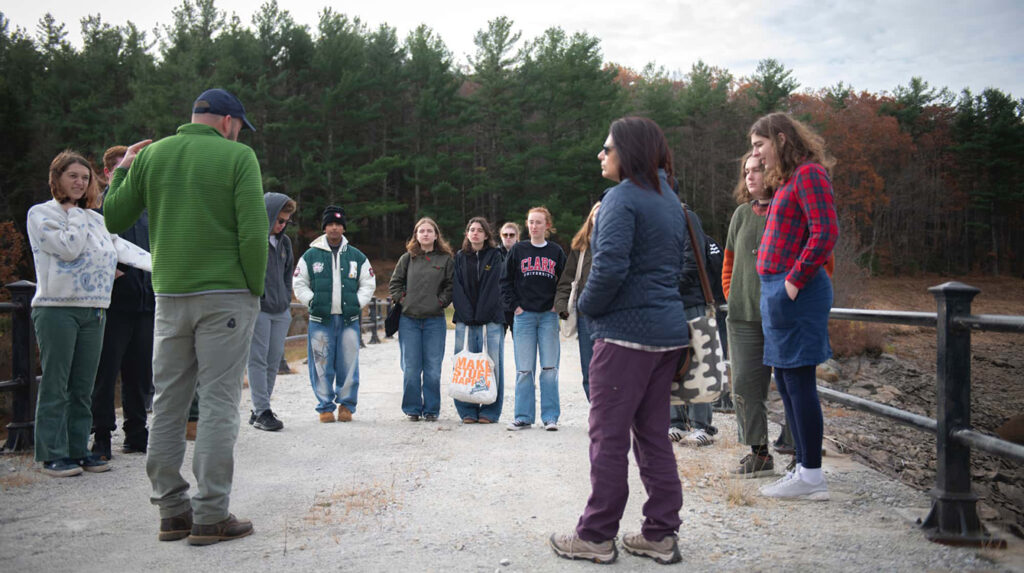You care about the world—its people, its ecosystems, its future. At Clark, you’ll trace the connections between shifting climates, economic systems, and human decisions — uncovering not just what’s happening, but why.
You can be part of the solution.

“Our work will be radically interdisciplinary and deeply rooted in places and communities.”
Lou Leonard
D.J.A. Spencer Dean of the School of Climate, Environment, and Society
Video: Department of Sustainability and Social Justice Professor Morgan Ruelle hosts “Bat Night” at Coes Reservoir, about a mile away from the Clark campus. Using smartphone-attached bat detectors, Ruelle and his students identify species, listen to their sounds, and learn about the health of our local ecosystem.
Career Communities are industry-focused groups designed to support your professional exploration and narrow down your career interests within specific fields. You’ll connect to opportunities, professionals, and information that will support your career development. The following communities may be of interest:
Sustainability, Climate and Global Change
The Clark Experience
The Clark Experience brings together the exceptional education you’ll receive in the classroom and so much more. Through focus and flexibility, it ensures you’ll leave Clark with the creativity, confidence, and resilience to succeed and lead a life of meaning and consequence.
Frequently Asked Questions
What can I do with a major in climate, environment, and society?
Climate, environment, and society encourages critically informed, practical work with social, ecological, and political intent. Practice opportunities might include environmental law with a major nongovernmental organization, environmental art in a science center, climate justice campaigns, pollution research, or alternative technology design.
What skills will I learn as a climate, environment, and society major?
- Knowledge of how the natural world and human society are mutually constitutive
- Theoretical and practical skills to understand processes of physical and social change
- Ability to apply classroom learning to solve real-world problems
Are climate, environment, and society major majors eligible for an academic achievement award?
Linda Roth Memorial Activist Scholar Award
Linda Roth was a graduate of the geography Ph.D. program at Clark University and was an accomplished, award-winning forest ecology scientist and a life-long social justice and environmental activist. This award is given to an outstanding global environmental studies major who embodies the principles of scholarship and activism that Linda Roth demonstrated during her life.
Global Environmental Studies Outstanding Student Award
The Global Environmental Studies Outstanding Student Award is given to an outstanding graduating senior who is recognized for academic excellence within the global environmental studies program.
Is there an honors program for climate, environment, and society majors?
During your junior year, you might be accepted into the global environmental studies honors program. Joining the program means you’ll work closely with a professor to create a thesis on a topic of your choice. Examples of recent honors thesis topics are:
- Reconciliation: Changing Pressures on Sustainable Urban Agriculture in Cuba
- Characterizing the Role of the Built Environment in Determining Juvenile-Tree Survivorship in Worcester, Massachusetts
- Characterizing Mangrove Distribution and Change in Antsohihy, Madagascar
- A Multi-Scale Assessment of Urban Forest Biodiversity: Tree Replanting as a Driver of Street Tree Composition
- Risks and Reasons of Lawn Chemicals: The Role of the Individual in Lawn Management
- Honors Program Guide
Be a force for change.
Come study at a small research university with a strong liberal arts core.

